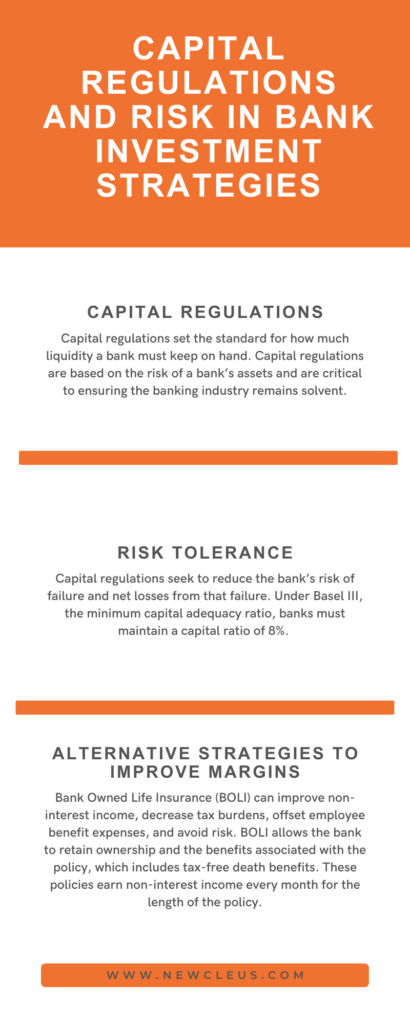


In the banking industry, capital regulations can be a major headache. While these regulations can be challenging, they do serve a greater purpose. With these regulations in place, it’s important for executives and the leadership team to understand what alternative investment strategies may be beneficial to the bank, while also remaining low-risk. Let’s dive deeper into these regulations and alternative strategies that can benefit your bank.
Capital Regulations: The Basics
Capital regulations set the standard for how much liquidity a bank must keep on hand. Capital regulations are expressed as a ratio and are based on the risk of a bank’s assets. These regulations are critical to ensuring the banking industry remains solvent, as these organizations are essential to the functioning of the economy.

Risk Tolerance
Capital regulations seek to reduce the bank’s risk of failure and net losses from that failure. Under Basel III, the minimum capital adequacy ratio, banks must maintain a capital ratio of 8%. This ratio is extremely regulated worldwide in order to ensure the global economy remains stable. Those in the banking industry may view these regulations as cumbersome and frustrating, they are necessary to ensure banks’ risk tolerance remains manageable.
Alternative Business Strategies to Improve Margins
With these regulations in place, it can be challenging for those in the banking industry to generate minimal risk investment strategies that enhance their margins. Bank Owned Life Insurance (BOLI) is one avenue that can improve non-interest income, decrease tax burdens, offset employee benefit expenses, and avoid risk.
BOLI is a life insurance policy that allows the bank to retain ownership and the benefits associated with the policy, which includes tax-free death benefits. These policies earn non-interest income every month for the length of the policy.
Under the current regulations, banks are able to invest up to 25% of their Tier 1 capital into BOLI. These earnings generated from this policy boost the non-interest income earnings, while lowering the capital (efficiency) ratios of the bank. The major goals of the policies are to offset employee benefit programs and retain your top talent.
In the current financial climate, the yields on BOLI are equivalent, if not better, than the current yields due to the global pandemic. Currently, the yields are equivalent to about 3-4% on a pre-tax basis.
Another attractive quality of these policies is that they can nearly completely offset the cost of non-qualified executive compensation plans, including SERPs, deferred compensation plans, healthcare premiums, and other employee benefit expenses.
BOLI offers banks a constructive investment opportunity that provides absolute returns and provides a risk management tool for banks in the case of a key executive passing. It can truly be an important aspect of diversifying your bank portfolio. At Newcleus, we provide the solutions you need to offset employee benefit expenses, retain your top employees, and improve your balance sheet.
